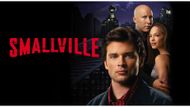Smallville carved out its own place in TV history over ten seasons. It is one of the longest-running superhero shows that started way back in 2001 and didn’t wrap up until 2011. The story followed Clark Kent, who started as a super awkward teen just stumbling through high school, and ended up becoming Superman.
Of course, they served up more than teenage melodrama. Nobody expected to feel that many feelings for the “bad guy,” aka Lex Luthor, but here we are. The way they painted Lex made it way more complicated, and also had us (secretly) rooting for him.
Smallville drastically evolved over a decade. What was initially high school drama, combined with “freak-of-the-week” stories, expanded over time into a grand retelling of the Superman mythology. Later seasons adopted the DC Universe in full, introducing the Justice League, classic villains such as Doomsday and Darkseid, and steering Clark towards his destiny.
Despite changes in tone and scale, the show had a consistent quality level, though certain seasons hit home more than others. Early seasons centered around small-city angst and personal conflict, while later tracts upped the ante with intergalactic war and superhero team-ups. The show’s genius was in reinventing itself while always placing Clark at the narrative center.
Let’s rank Smallville’s entire ten-season run, weak to strong, in terms of storytelling, characterization, themes, and critical reception. The intention is to provide readers with a concise understanding of how the show evolved, its highs and lows, and what it left behind.
Every Smallville season ranked from weakest to strongest
Season 1: A strong start, uneven execution

Its initial season provided foundations, but it works as Smallville’s least strong. The season introduced us to Clark, Lex, Lana, and the Kents while also establishing the template: Clark battling meteor-infected bad guys in episodic “freak-of-the-week” stories. The formula worked in terms of accessibility, though it lacked overarching storytelling.
The season excels in characterization. The potential friendship of early Clark and Lex sounds authentic, and the future conflict has a dramatic impact. Tom Welling’s Clark and Michael Rosenbaum’s tormented Lex anchored the show with dedicated performances.
The show stumbled in pacing at times, and Superman mythology was minimal, yet there were good moments in the pilot and season finale. It also held hope for what was to come.
Season 4: Finishing senior high with mixed outcomes

Smallville Season 4 completed Clark’s high school life and introduced Lois Lane, whose assertive presence added new zing. Season highlights such as the opener Crusade and closer Commencement combined action and dramatic consequences.
But erratic storytelling dulled the season. The Lana Witch bloodlines and Teague family storyline came across as unnatural, straining the show’s genuine tone. Yet episodes such as Clark’s initial flight under the influence of red kryptonite and Lex’s erosion of morality kept supporters hooked.
Season 4 successfully concluded Clark’s teenage period, paving the path to adult life.
Season 7: Lex’s descent, storytelling in flux

Smallville Season 7 centered around Lex becoming a full-on villain, and Michael Rosenbaum gives some of his best performances. The show furthered its mythology, introducing Kara Kent (Supergirl) and additional Kryptonian history. It added dramatic flair in episodes such as Bizarro and Descent.
But uneven pacing and faulty arcs kept the season short of its potential. The renewed romance between Clark and Lana felt like a narrative step backward, and Zor-El and Brainiac’s plots seemed underwritten. Season 7 was high drama, though it did not always succeed in maintaining narrative coherence.
Season 2: Gaining momentum and expanding mythos

Smallville Season 2 enhanced narrative concentration and assimilated Superman mythology more effectively. The promotion of Lionel Luthor to the main cast raised the stakes, while Clark learned about his Kryptonian identity, attained heat vision, and confided in Pete Ross.
While episodic “freak-of-the-week” stories persisted, the season interwove character arcs with purpose. The aftermath of the finale defined later seasons, engineering a turning point toward serialized storytelling. Some filler episodes prevented the season from ranking higher, but it provided a foundation for the show’s progression.
Season 6: Consistent storytelling and the Justice League

By Season 6, Smallville struck a good balance of personal drama while broadening its superhero scope. Oliver Queen/Green Arrow debuted in live action, hinting at the Justice League. Clark learned super-breath, and season-long villainy by Lex Luthor added to continuity.
The season struck a nice blend of world-building and character-driven drama. Lana’s rocky marriage with Lex added emotional investment, and episodes like Promise and Justice showed strong storytelling.
Though there was still a bit of “freak-of-the-week,” Season 6 is remembered fondly as one of the more stable and enjoyable spans of the show.
Season 5: Transitional, ambitious, uneven

Smallville Season 5 brought Clark and friends into college and adult life. Early moments included Brainiac introducing himself and Jonathan Kent dying in an emotional scene.
It stumbled in the second half, overemphasizing Lana and Clark’s love life and underdeveloping certain mythology-based plots. Aquaman and Cyborg came across more as experiments than integral elements of the narrative. Despite such inconsistency, Season 5 linked adolescence to Clark maturing as an idealistic superhero.
Season 8: Bold ambitions, uneven payoffs

Season 8 of Smallville had substantial new cast additions, such as Davis Bloome/Doomsday and Tess Mercer. Clark also began getting into his superhero persona as the Red/Blue Blur. The season continued with DC Universe additions of Legion of Super-Heroes and the Injustice League, while Lois continued to develop as a determined journalist.
But the Doomsday arc, made complex by a human alter ego, polarized fans. The season finale disappointed a few viewers, but its scope and willingness to venture elsewhere render it a fan favorite.
Season 10: Closing the circle with Superman

Smallville’s final season fully embraced Clark’s transformation. Darkseid provided high stakes, while Booster Gold, Connor Kent, and other DC characters enriched the world. Clark and Lois’s long-awaited marriage anchored the season, and Lex and Lionel’s return tied back to the show’s beginnings.
Visuals at times reflected network constraints, yet the finale, Clark in the Superman suit, provided adequate closure, striking a good balance between fan service and grand superhero narrative.
Season 3: Darker themes, peak storytelling

Smallville Season 3 is widely regarded as the show’s pinnacle. It introduced darker, more mature themes, exploring betrayal, identity, and destiny. Lex’s psychological unraveling under family pressure and ambition gave Michael Rosenbaum a career highlight.
Clark’s identification as Kryptonian intensified under the influence of Jor-El, and episodes both in serialization and as specials flowed smoothly. The season also saw the arrival of Perry White, connecting Clark’s teenage life to the forthcoming Daily Planet.
The season’s balance of mythology, characterization, and emotional investment makes it the highlight of Smallville.
Season 9: Confident, mature, and focused

By Season 9, Smallville had shed much of its high school baggage, providing a dark, serialized narrative akin to Superman’s Year One. Major Zod was a compelling villain, and both Watchtower and Justice Society storylines added to the DC Universe.
Clark forged his superhero identity as the Blur, and his love affair with Lois reached new emotional depth. Apocalyptic stakes and serialization planted an unusual urgency in Season 9. Though a few late episodes slowed in tempo, Season 9 is collectively praised as the show’s strongest and most effective late-stage work, setting Clark at the cusp of his final transformation.
